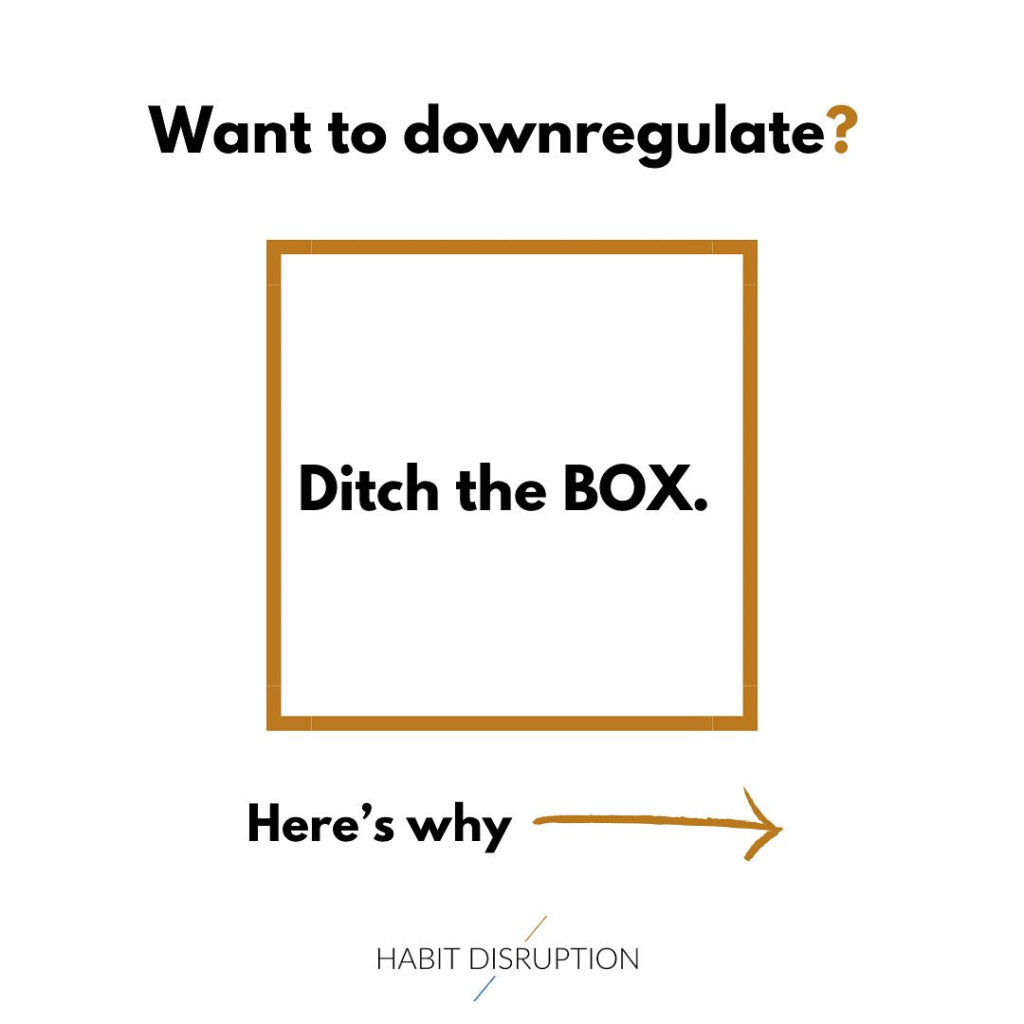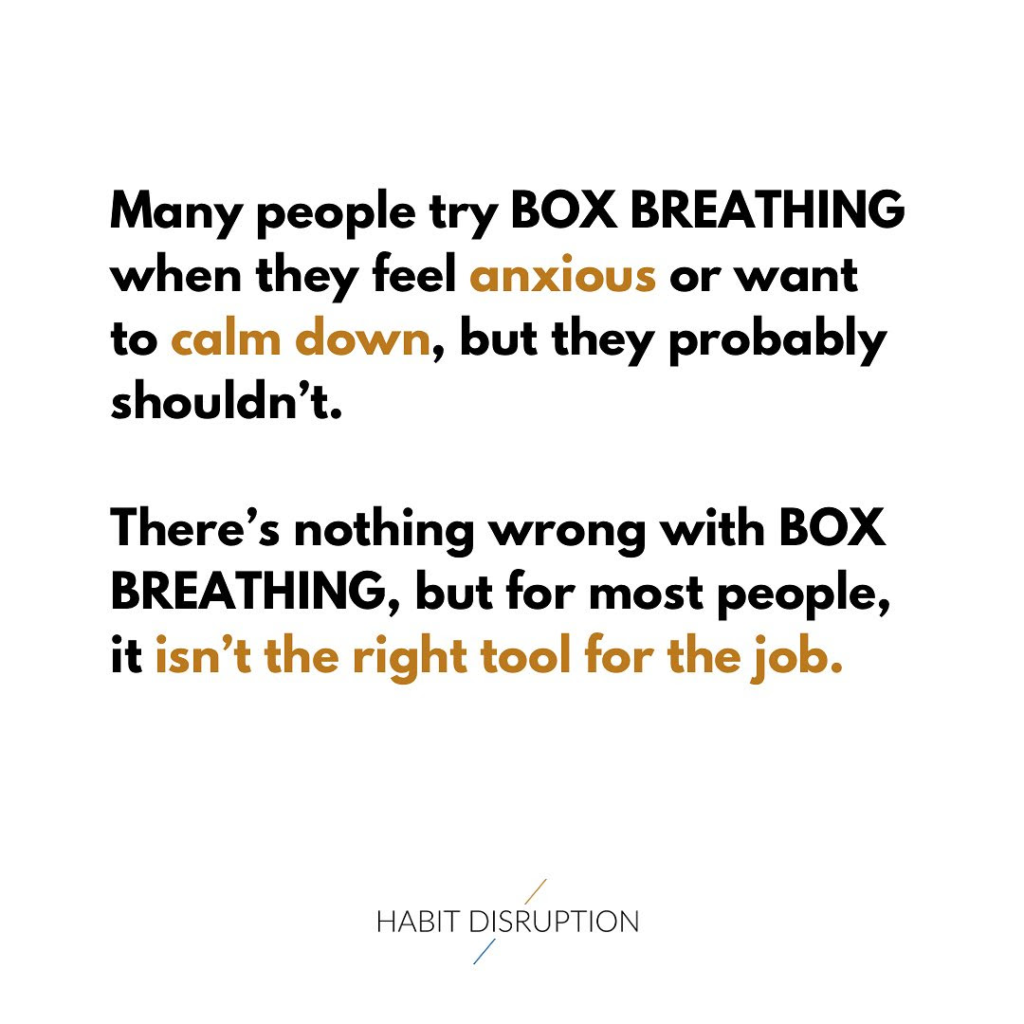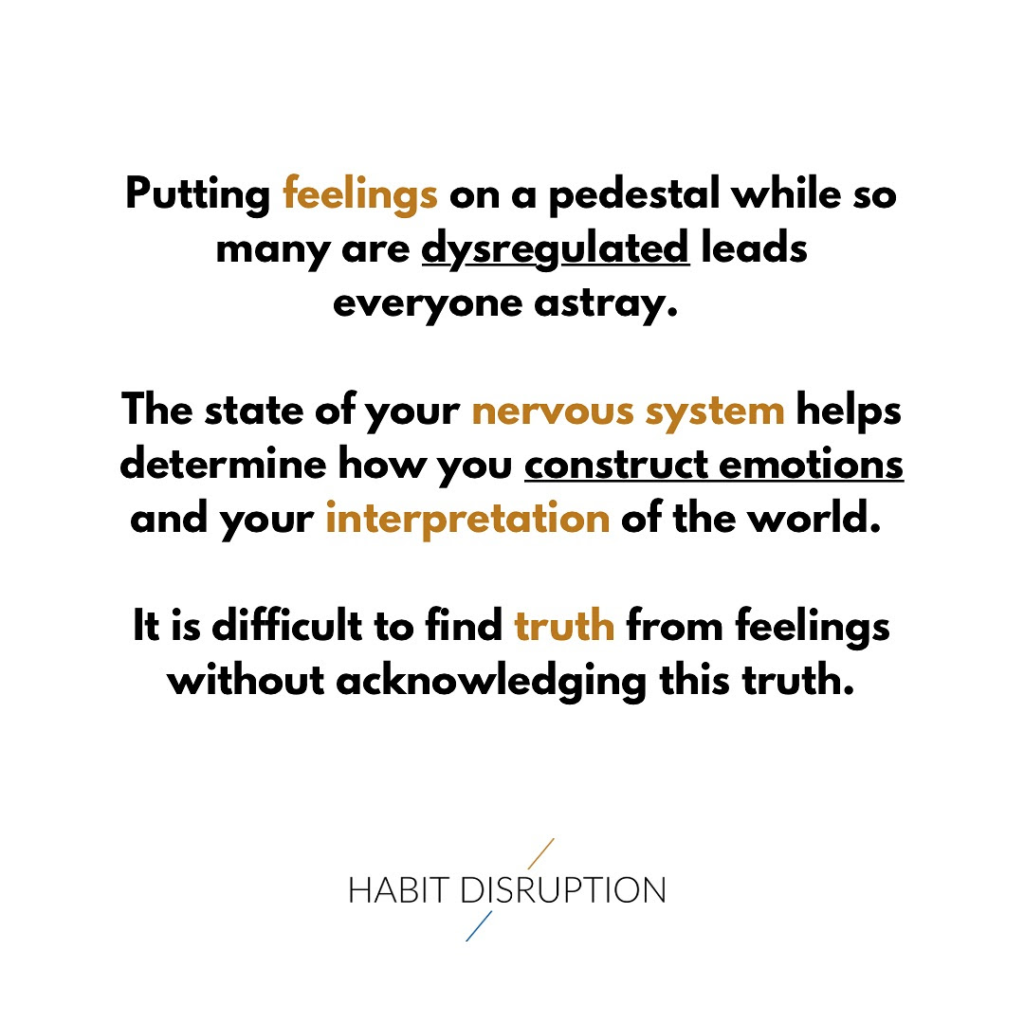
Everything is fast paced these days.
News
Delivery
Deadlines
Workouts
So it’s natural for your breathing to get carried along with it.
And it turns out, it probably has.
According to the Cleveland Clinic, the MEDICALLY NORMAL respiration rate is 12-24 breaths per minute.
 What 24 BPM really means is inhaling for 1.25 seconds and exhaling for 1.25 seconds with no pauses.
What 24 BPM really means is inhaling for 1.25 seconds and exhaling for 1.25 seconds with no pauses.
Give that a try for 30 seconds and see how that feels.
And you wonder why everyone is so anxious???
It may be normal, but it sure isn’t HEALTHY.
Your breath is like a remote control for your autonomic nervous system.
 Which means that the way you breath all day can literally push you into or out of a stress response.
Which means that the way you breath all day can literally push you into or out of a stress response.
FASTER breathing means more stress, SLOW means less.
So as you’re going about your day, sitting at your desk, going on a walk, even some light exercise, can you notice how quickly you start breathing FAST and try slowing things down just a bit?
Can you accomplish stuff without amping yourself up?
Learning this skill can do wonders for improving resilience to stress in the rest of your life.
There’s no way of opting out of the mind-body connection.
When you’re excited, you usually feel pretty good.
When you’re in a low mood, your breathing is likely to be depressed and held.
Your body is always listening to the mental chatter and responding accordingly— not to punish you, but to actually try to help!
But when the mental stress turns into physical tension and usually your breathing shifts to being held or it speeds up.
And when there is no accompanying physical movement that can be damaging to our physical mental and emotional health over time.
This isn’t about policing your thoughts and never allowing anything negative to cross your mind.
It’s about building an awareness of how your breathing and tension patterns shift throughout the day and learning how to intervene when the physical response to any mental stress, anxiety or frustration is manifesting in ways that are just going to exacerbate that mood or mental pattern.
So knowing that you can’t escape this reality, what are you currently doing throughout your day to actively notice and make some choices about what’s happening in your body based on your thoughts?
If you don’t know the answer, then chances are that it’s not what you’d intentionally CHOOSE.
And asking yourself, this question can be tender as you may imagine that you’re optimizing for what you want, when in reality what you actually do, day-to-day might be so far away from that.
It’s so easy to let the circumstances of life determine our behavior.
But that daily behavior impacts our stories and our nervous systems-and as a result, our health and well-being.
And too frequently, when we aren’t consciously optimize for something, we’re actually optimizing for chaos.
So what is one small step you can implement today to try to better support something you’d actually LIKE yo optimize for?
A timer for 5 minute breathers a few times throughout your workday?
Putting your phone in the other room when hanging out with your family?
Make one small intentional choice consistently and watch how it blossoms into the rest of your life.
I’m no parenting expert. I’m not a psychologist and I haven’t read all the books.
But I have found 3 things to be universally true:
1. When we are past our capacity the tiniest things can throw us over the edge. This is true whether you are 3 or 63.
2. It’s a good idea not to put too much value on your feelings when you are in those states as capital T TRUTHS.
3. Witnessing without judgement is a gift we so RARELY give ourselves.
I can ignore my kid, walk away and let her cry it out, I can punish and force her to stop, or I can witness with love.
The same is true for your own inner kid.
And if you haven’t spent much time tuning in, slowing down, listening to your own internal sensations when there is no emergency, it will be very challenging to do so when you are all stirred up.
That’s why embodiment is the proactive practice for real life stress.
It builds capacity.
Breathwork doesn’t have to be still.
Breathwork doesn’t have to be calm.
Breathwork doesn’t have to be….anything really.
You’re breathing all day long, so if you make a conscious choice about HOW you’re breathing, that’s breathwork in my book.
Here’s what happens to A LOT of people:
You sit all day at a computer.
You get tired mentally and perhaps you get anxious or your mood drops as a result.
And so because you can’t think clearly or don’t feel great, you think you should do some breathwork or meditation.
So you sit down to meditate, but sitting still feels impossible.
Quieting your mind feels impossible.
After all…you’ve just been SITTING all day. Your body is probably craving movement!
And so then you feel bad that you can’t focus and the thing that’s supposed to help your mind feel better also feels bad.
But “breathwork” doesn’t have to be still.
What if sometimes it’s active?
What if it’s playful?
What if it’s in motion?
What if it’s a walk?
What if it’s rowing?
What if it’s stretching?
What if it’s any slow repetitive motion that feels good?
And what you’ll find is that by incorporating some kind of moving breathing BEFORE you try to sit still and quiet your mind, you’ll probably have a much more pleasurable experience.
Breathwork doesn’t have to be still.
Breathwork doesn’t have to be calm.
Breathwork doesn’t have to be….anything really.
You’re breathing all day long, so if you make a conscious choice about HOW you’re breathing, that’s breathwork in my book.
Here’s what happens to A LOT of people:
You sit all day at a computer.
You get tired mentally and perhaps you get anxious or your mood drops as a result.
No matter where you are today, close your eyes and take 3 minutes to sit and breathe with me.
This is NOT box breathing, but triangle breathing
It’s similar to a box, but you cut out the final exhale hold.
Because of this, it should help you downregulate faster, help your heart rate decrease and be quite calming.
inhale: pause: exhale
I did 5:5:5, but the exact number doesn’t matter too much as long as it’s on the slower side.
Experiment with 3:3:3, 4:4:4, and 5:5:5 to see what feels good for you.
Let me know in the comments how it goes and share with someone who might need a breather today.
Consistency is the only way to succeed over time.
And too many of the things you’re doing to:
“Get after it!”
“Crush it!”
or “Rise & grind!”
are actually PREVENTING you from showing up consistently with focus, energy and dare I say, love.
Does this mean you shouldn’t work hard or sprint sometimes?
Absolutely not.
But pretending you can go after each and every day relentlessly either in your workouts, at work or in business without there eventually being consequences is misunderstanding the physical realities of living in a human body.
AND the things you do in the short-term to try and override these realities (stimulants, fad diets, cold plunges) will eventually stop working for you if your nervous system continues to never get a chance to down regulate.
 Remember the tortoise. and the Hare
Remember the tortoise. and the Hare
Most people think it’s all about the event.
Exercise = good stress.
Money troubles = bad stress
An escape room puzzle = good stress
Losing a loved one = bad stress
And while I agree that some things are just inherently not “good” the reality is that the event itself doesn’t actually determine whether the stress leads to positive or negative health outcomes.

Here’s what REALLY makes stress good or bad:
1. The state of the nervous system going into it
Your state of arousal, energetic resources, level of groundedness plays a HUGE role in whether you interpret a situation as good or bad, stressful or manageable. When you are well rested and feeling supported, someone can cut you off in traffic and you only find it slightly annoying, whereas when you’re already amped up, bad traffic can ruin your whole day.
2. Your mindset before during & after
Your interpretation of whether or not the stress is bad for you or not literally transforms your physiological response to the stress. If you think stress is there to give you energy and focus to deal with a problem, then you will have a challenge response much like exercise (good stress) and if your think stress is a scary, you’ll have a threat response (bad stress.)
3. Your ability to recover from it.
Even if you have a HUGE stressor that pops up and you have a HUGE stress response, that doesn’t automatically make it harmful—how long the stress response stays turned on is what matters. If you are able to DOWNREGULATE & recover when the stressor is over, then your health will not be harmed long-term.
Surprising?
Share this with someone who might need a little re-frame on their relationship to stress.
The things we try to avoid the most are usually the things we need the most.
I’ll make this simple:
-High pressure fast paced jobs
-Sitting in front of a screen all day
-Being productivity focused
are all highly sympathetic, stressful and USE a high amount of energy.
While exercise is incredibly beneficial, and short-term can boost your mood, it also USES a high amount of energy.
 So if exercise is your only tool for de-stressing, eventually it will become unsustainable as what you really need is something that REPLENISHES your energy.
So if exercise is your only tool for de-stressing, eventually it will become unsustainable as what you really need is something that REPLENISHES your energy.
And that’s where down regulation practices are so important.
They are required for helping your body get into a mode where it can divert, energetic resources towards cellular restoration, digestion, sleep, immunity, longevity, and reproductive health.
 AND if you have an aversion towards quiet, that is a good sign you aren’t getting in those deep rest states frequently enough.
AND if you have an aversion towards quiet, that is a good sign you aren’t getting in those deep rest states frequently enough.
But the good news is, once you learn how to do so frequently and successfully, it will actually GIVE you more energy to do all of the work, productivity, and working out that you crave and love.
So it turns out that doing nothing can actually be the most productive thing you do all day.
If only healing with something as simple as pressing a button.
Scrolling through this app you think it was.
 There’s so many promises of RESETS out there, but the truth is that there is no technique, method or breathwork that can instantly reset your nervous system.
There’s so many promises of RESETS out there, but the truth is that there is no technique, method or breathwork that can instantly reset your nervous system.
Now breathwork CAN quickly shift your nervous system from one state to another in a matter of minutes—which is one reason why it’s amazing!
And it can feel like a reset during your hectic day.
But has that reset your nervous system? No.
Because what does RESET even mean?
Going backwards in time?
Returning to some hypothetical version of yourself that hasn’t experienced what you’ve experienced, or learned what you’ve learned?
 That’s not healthy, that’s denial.
That’s not healthy, that’s denial.
Your nervous system is complex and is the way it is because of an interwoven mix of past experiences, learning, sensory data, level of arousal, breathing habits, environmental cues, mindset and more.
Anyone promising they can return you to factory settings is either misinformed, untrustworthy or potentially dangerous.
NOW, can your nervous system change? Adapt? Heal?
*DATE CHANGE*
Stress impacts your mental & physical health, mood, energy levels & MOST IMPORTANTLY, how kind, empathetic and generous you are capable of being each day.
Come learn the skills required to transform your relationship to stress for good in this virtual group class.
This is a CRAZY discounted mini-version of my 1:1 coaching programs and includes four 75 min classes, weekly exercises, an accountability spreadsheet to track your progress, audio tracks, videos & more.
Week 1: Relief
Week 2: Resilience
Week 3: Burnout Prevention & Habit Building
Week 4: Mind-body Integration
ABSOLUTELY!
But it’s a process.
It requires time, awareness, patience, and consistency.
All things that aren’t sexy sellers.
But it’s the truth.
And if you want to do more than just have an experience, it’s the only way that I know to make meaningful transformation.
Stay safe out there.
What physical sensations are the hallmark of a stress response?
Increase in heart rate
Feeling energized
Faster or deeper breathing
Alert
Now, imagine a game night and you’re playing charades
Or you have to solve a problem right before a meeting
Or you’re playing basketball and it’s game point
Would any of those “stress” physiological responses be helpful?
Absolutely.
I almost wish I could rename the stress response to an activation response because the word stress has such a negative connotation today.
It’s nearly impossible to convince people that this response isn’t good or bad, it just IS.
Now what is helpful/less helpful is your mental interpretation or story about the response. Because that actually can change how it shows up, how your heart reacts, and how long the stress response stays turned on.
The next time you notice yourself getting “stressed” see if there is any reason why your body might be trying to help you with more energy and focus. If so, thank you. Use it.
And when you’re finished, down-regulate and help lower the heat.

Testimonial
I am a lawyer in the financial service industry, Over the years as my role expanded. Then the pandemic hit and caused an uptick in my general life stress. Whitelaw staring at her computer screen felt overwhelmed, so badly she felt like she couldn’t breath. It was 9am and overnight she received 50 emails for her to deal with. Then she got up from her office chair and when she returned there were 20 more.
She couldn’t calm herself and knew she had to find a better way, Jill felt tense all the time as her doctor increased her Lexapro in November of 2021. Which she had me on for many years then added blood pressure medicine — a new condition brought on by stress. I initially felt better than eight months later, the same stress sensations and panicky feelings returned. I reached a low point and couldn’t even handle looking at my emails.
Then in August 2022 her life coach suggested breathwork and a practitioner of the Alexander technique, a gentle movement and posture practice that can calm the nervous system and found Kevin Munhall’s website Habit Disruption. Which talks about mindful controlled breathing that can reduce anxiety, depression and stress. In his office Kevin saw I heard tension that prevented me from getting a full breath.
Hope & Peace At Last
At our first session Kevin taught breathing techniques to help relax the nervous system. Laying on the table he asked for me to breathe through my nose for 3 seconds then out my nose for 3 seconds. Through each progression which got longer and longer, I immediately felt the heaviness lifted as I felt lighter and lighter, as it was so much easier to move. He said in time you will have the power to calm yourself and I felt filled with HOPE. I then practiced everything he taught me to do in our weekly home sessions.
Now if I feel really nervous: I inhale for a count of 4. Then hold it for seven and exhale for an eight count. I feel calmer immediately — sometimes I do box breathing. a cycle of inhaling for a 5 count, holding for a 5 count then exhaling for a 5 count, then holding for a 5 count and then repeating. It works wonders as I feel calmer and more refreshed, energized in a calm way. Today I feel like I have myself back, and feel capable of handling anything that comes my way and I am more willing to take on new challenges.
When we are stressed our fight or flight is activated causing our breathing to become more rapid and shallower. By slowing our breathing down it appears to send signals to the brain that slows our heart rate down. Which reduces the stress hormone cortisol which produces feelings of calm, says Patricia Gerbarg MD., assistant professor of psychiatry at New York Medical College and co-author of the healing Power of the Brain. She suggests beginners to connect with Certified Practitioners to learn proper technique and to find one on BREATH-BODY-MIND™ | Evidence-based Integrative Health
#stress#stressmanagement#stress relief#anxiety#anxiety relief
#mindbody#mindful living#breathe#breathwork#breathing#breath


